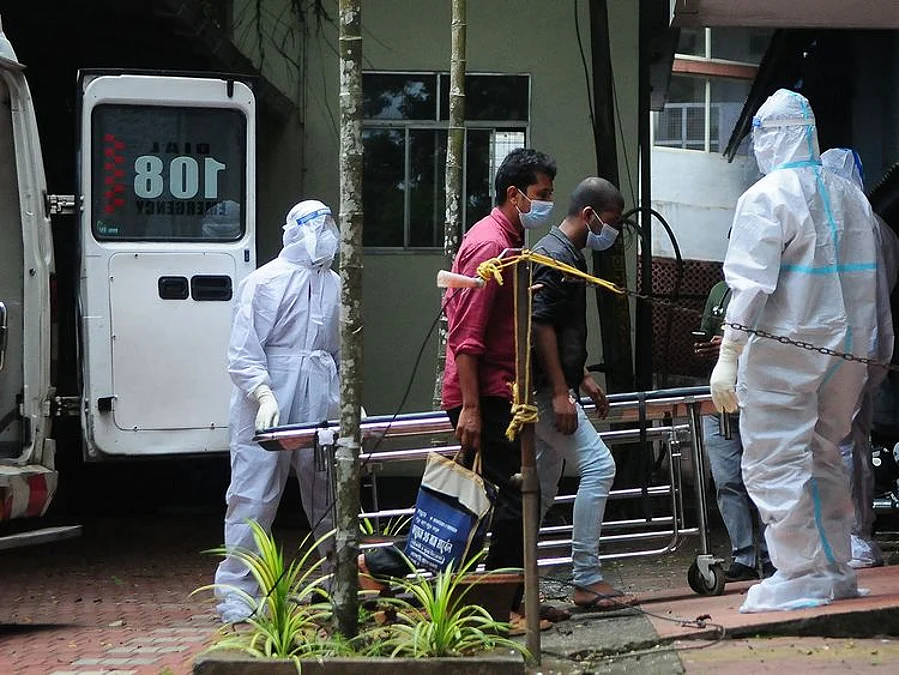By Lekshmy Pavithran
A 38-year-old woman from Palakkad who tested positive for the Nipah virus is currently in critical condition and on ventilator support at Kozhikode Government Medical College Hospital, according to local media reports.Initially admitted to Perinthalmanna’s Moulana Hospital, the patient was shifted to Kozhikode after her samples were confirmed positive by the National Institute of Virology (NIV) in Pune, Manorama News reported..Travelling to Kerala from UAE? Nipah virus triggers high alert. Health officials confirmed that the patient has been administered monoclonal antibody treatment. In a major relief, her daughter and a 10-year-old relative—both showing symptoms and listed as high-risk contacts—have tested negative for the virus. 57 quarantined in PalakkadThe Palakkad health department has identified 91 people who came into direct contact with the Nipah patient. Among them, 57 have been quarantined, and a total of 110 individuals are under observation.To contain the outbreak, authorities have set up a 24-hour control room, formed a 25-member response team, and established a 40-bed isolation unit at Palakkad Government Medical College. Health Minister Veena George has directed that all contacts be isolated within the district.Containment zones declared, inspections underwayContainment zones have been declared in six wards: 7, 8, 9, and 11 of Thachanattukkara Grama Panchayat, and wards 17 and 18 of Karimpuzha Grama Panchayat. Only essential services are permitted in these areas, and strict enforcement of restrictions is ongoing.Inspections have commenced within a 3-kilometre radius of the patient’s residence to trace the source of infection and identify any additional cases.District Collector G. Priyanka has appealed to the public to avoid visiting areas where bats are commonly seen and advised against disturbing or harming the bats, which are suspected to be the source of the outbreak.High alert in 3 districts, 425 under surveillanceHealth Minister Veena George is scheduled to visit Palakkad on Sunday for a high-level review meeting with district health officials.On Saturday, the state health department confirmed that the death of 18-year-old Bishara Nehrin in Kozhikode on July 1 was due to Nipah infection. With two confirmed cases, including one fatality, a high alert has been issued in Malappuram, Palakkad, and Kozhikode districts.Kerala Health Minister Veena George confirmed the contact list includes 425 people: 228 in Malappuram, 110 in Palakkad, and 87 in Kozhikode. So far, one contact has tested negative.Malappuram launches aggressive containment driveAuthorities in Malappuram have conducted an extensive containment effort, covering 20 wards across four panchayats. Sixty-five teams surveyed 1,655 homes to trace contacts and raise awareness. The effort was led by Dr. N.N. Pameela with support from a technical team, and a detailed report has been submitted to the district health office.Close watch in Palakkad and KozhikodeIn Palakkad, one patient remains isolated, and 61 healthcare workers have been identified as close contacts. The department isolates contacts locally, sending only samples for testing. In Kozhikode, all 87 contacts are healthcare workers potentially exposed during treatment.Route maps and psychological support in placeAuthorities have released route maps of confirmed cases to aid contact tracing and public awareness. Ambulance services, such as the Kaniv 108 fleet, are on standby, and fever surveillance has been intensified. The health minister emphasized the importance of psychological support for those under observation.Central team may join response effortsThe Central Surveillance Unit of the IDSP and the National Centre for Disease Control (NCDC) are coordinating closely with Kerala’s health authorities. Deployment of a National Joint Outbreak Response Team (NJORT) is under consideration, and a state-level control room has been activated to oversee containment.Two confirmed cases, one death reportedThe first confirmed case was Bishara Nehrin, an 18-year-old woman from rural Malappuram, who died on July 1. Her samples tested positive for Nipah virus at Kozhikode’s Regional VRDL lab.The second case is Hasanath, a 38-year-old woman from Palakkad, currently on ventilator support. Her samples tested positive at NIV Pune on July 4.Fruit bats suspected as sourceInvestigations point to fruit bats, known natural carriers of the Nipah virus, as the likely source. Bishara’s residence was near forested areas with fruit orchards reportedly frequented by bats.High-level review meeting heldA district-level review chaired by Health Minister Veena George included top officials from the health department, National Health Mission, police, and other key departments. Strategies for containment, contact tracing, and public communication were discussed..What is Nipah Virus?Nipah virus (NiV) is a deadly zoonotic virus that spreads from animals (mainly fruit bats and pigs) to humans and can also transmit from person to person. First identified in 1999 in Malaysia, it causes outbreaks almost annually in parts of Asia, especially Bangladesh and India.Kerala has experienced six Nipah outbreaks since 2018, the first claiming 17 lives, including nurse Lini Puthussery, who died treating the initial patient.How it spreadsDirect contact with infected animals (bats, pigs, etc.)Consuming contaminated food or drinks (like raw date palm sap)Close contact with bodily fluids of infected individualsThrough respiratory droplets (airborne transmission is possible)SymptomsInitial: Fever, headache, cough, sore throat, vomiting, muscle painSevere: Encephalitis (brain inflammation), confusion, seizures, comaSymptoms appear 4–14 days after exposure.ComplicationsDeath rate ranges from 40% to 75%Long-term issues include seizures, personality changes, and relapsesSome people remain symptom-free but carry the virusDiagnosisEarly diagnosis: RT-PCR tests using throat/nasal swabs, CSF, urine, or bloodLater stages: ELISA tests for antibodiesTreatmentNo specific antiviral treatment or vaccine exists. Care is supportive:Hydration, rest, fever controlMedications for nausea, seizures, and breathing issuesExperimental monoclonal antibody treatments are under studyPreventionAvoid contact with bats and their secretionsDo not consume raw date palm sap or soiled fruitPractice hygiene and wear protective gear around infected patientsMonitor symptoms after visiting high-risk areas
